Christian
Mitt Romney on Saturday delivered the commencement speech at Liberty University. The Los Angeles Times has video and the full transcript of the speech.
Read full transcript HERE.
Editor's Note: Yesterday, President Obama announced his personal support for same-sex marriage. Within the Christian community and the nation at large, there are a diversity of opinions regarding human sexuality. While often a divisive issue, Sojourners has released the following statement encouraging respect for equal rights, religious liberty, and civil discourse.
"Sojourners supports equal protection under the law and full legal rights for all people regardless of sexual orientation. We affirm the right of faith communities, congregations, and religious organizations to define marriage in accordance with their own traditions and interpretation of Scripture....
 TRANSCRIPT OF PRESIDENT OBAMA'S INTERVIEW WITH ABC NEWS ON SAME-SEX MARRIAGE, MOTHER'S DAY, ET AL
TRANSCRIPT OF PRESIDENT OBAMA'S INTERVIEW WITH ABC NEWS ON SAME-SEX MARRIAGE, MOTHER'S DAY, ET AL
ROBIN ROBERTS: Mr. President. Thank you for this opportunity to talk to you about-- various issues. And it's been quite a week and it's only Wednesday. (LAUGH)
PRESIDENT OBAMA: That's typical of my week.
ROBIN ROBERTS: I'm sure it is. One of the hot button issues because of things that have been said by members of your administration, same-sex marriage. In fact, your press secretary yesterday said he would leave it to you to discuss your personal views on that. So Mr. President, are you still opposed to same-sex marriage?
PRESIDENT OBAMA: Well — you know, I have to tell you, as I've said, I've — I've been going through an evolution on this issue. I've always been adamant that — gay and lesbian-- Americans should be treated fairly and equally. And that's why in addition to everything we've done in this administration, rolling back Don't Ask, Don't Tell — so that — you know, outstanding Americans can serve our country. Whether it's no longer defending the Defense Against Marriage Act, which — tried to federalize — what is historically been state law.
I've stood on the side of broader equality for — the L.G.B.T. community. And I had hesitated on gay marriage — in part, because I thought civil unions would be sufficient. That that was something that would give people hospital visitation rights and — other — elements that we take for granted. And — I was sensitive to the fact that — for a lot of people, you know, the — the word marriage was something that evokes very powerful traditions, religious beliefs, and so f-orth.
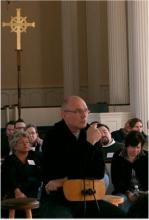
An interconnected, interdependent world means a greater intermingling of faiths and the possibility for conflict. We’ve seen it in the United States in anti-Shariah legislation and the recent atheist Reason Rally.
Theologian Miroslav Volf, director and founder of the Yale Center for Faith and Culture, argues that globalization and the resurgence of faith in the United States increases the need for pluralism in public life.
Editor's Note: Earlier this week, our intrepid blogger/reporter/resident-God-Nerd Christian Piatt sat down with the makers of the highly-anticipated film Blue Like Jazz — Donald Miller, director Steve Taylor and Marshall Allman, the actor who portrays protagonist "Don" in the screen adaptation of Miller's best-selling memoir — to talk about faith, film and ... fate.
Blue Like Jazz premiered at the SXSW Festival in Texas earlier this month and opens nationwide April 13. Piatt caught up with the filmmakers in a Colorado Springs theater where they were hosting a sneak-peek screening and persuaded the gents to unpack the story of the-little-film-that-could and the Spirit that buoyed them along the way.
The wide-ranging interview covers everything from John Coltrane's "A Love Supreme" and what Miller calls "dangerous theological ideas" to the astounding grace of God and peanut butter cups. Fascinating and funny, the conversation with the hearts and minds behind Blue Like Jazz is a humdinger.
Watch the interview in its entirety and read Piatt's reflections on the film and his conversation with its makers inside the blog ...
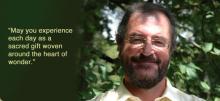
To bless someone, in the most literal sense of the word, is to confer your hopes to them.
That's why so many traditional blessings begin with the word "may."
Take, for instance, what is perhaps the best-known Irish blessing (or toast, as the case may be this time of the year):
May the road rise up to meet you.
May the wind be always at your back.
May the sun shine warm upon your face;
The rains fall soft upon your fields and until we meet again,
May God hold you in the palm of His hand.
"May" doesn't mean "so be it." May implies that something is possible, but not a done deal. May hopes that God puts it in play and that you get out of your own way and allow it to happen.
John O'Donohue, the great contemporary Irish poet/philosopher (and former Catholic priest), knew the power of "may."

FOX NewsChannel host Sean Hannity calls the Rev. Jesse Lee Peterson, "the most courageous, outspoken critic of the liberal left and the so-called 'black leadership' in America today."
He also calls him pastor.
Peterson, 62, is president and founder of The Brotherhood Organization of A New Destiny (BOND) — an organization dedicated to promoting the conservative agenda in the African American community. Host of his own radio and television programs, Peterson also is a member of Choose Black American, which stridently opposes illegal immigration in the United States and a former member of the California Christian Coalition.
Hannity has hosted Peterson as a guest on his Fox show numerous times and sits on the board of BOND, which he lauds for having, "played an instrumental role in helping young men and women build lives which will help inspire the next generation. BOND continues to fight the good fight standing for the values of God, family, and country, and are deserving of our support."
On March 5, Peterson took to the airways on his "Exploring Your Destiny with Jesse Lee Peterson" program and delivered a message/sermon titled, "How Most Women Are Building a Shameless Society." The video clip came to our attention Thursday afternoon, when Fox and Daily Beast contributor Kirsten Powers, a Democtrat who also happens to be an evangelical Christian, began posting a litany of tweets on Twitter castigating Peterson for his blatant misogyny.
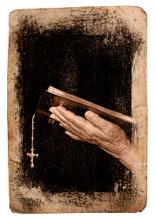
We’ve been hearing a lot in the news media lately about women’s bodies. Just when we thought the messy fight over contraception was over, Democrats and Republicans are butting heads again over renewal of the 1994 Violence Against Women Act, a once widely supported bill that is now being met with opposition from Republicans due to new provisions that “would allow more battered illegal immigrants to claim temporary visas, and would include same-sex couples in programs for domestic violence,” according to the New York Times.

I've been speaking at many small colleges that have historical ties to the oldest mainline denominations in the U.S. I have been noticing something interesting: a terrific hunger for a deeper spirituality on the part of many young people who come from evangelical backgrounds like mine and also like me are looking for something outside of the right wing conservatism they come from.
I've also noticed that while some people in the so-called emergent evangelical movement are reaching out to these young people the leaders of the mainline denominations both locally and nationally often seem blind to a huge new opportunity for growth and renewal staring them in the face. That new opportunity is the scores of younger former evangelicals diving headlong out of the right wing evangelical churches.

Last fall on God's Politics, we ran a few posts on the plight of Youcef Nadarkhani, a Muslim convert to Christianity who was arrested, charged with apostasy, tried, convicted and sentenced to death in Iran in 2010. We asked for continued prayer for the pastor and his family, and for people of conscience to speak out on his behalf.
Fast-forward five months...
As I was browsing through Facebook last night, I noticed a post on my news feed with the photo of a blindfolded man standing next to the executioner's noose and a headline that read, "Youcef Nadarkhani Executed."
My heart stopped for a moment. Please, no, I thought. And the guilt began to flood in: How could I have dropped the ball? If we had continued to sound the alarm on his behalf, would he have been hanged? Could we have helped save him if we'd done more?
I quickly went to Google to look for news reports of Nadarkhani's execution, reportedly on March 3. But I couldn't find any. Nothing on CNN, BBC, Al-Jazeera, NPR.
After searching for a while, I found a post by the American Center for Law and Justice that confirmed what had become my hope: Reports of Nadarkhani's execution were false.

When Marilyn and Larry Johnson sold their computer business in suburban Detroit about a decade ago, they figured they'd settle into the next phase of their lives with ease. Retirement meant more freedom, fewer pressures and ample time on the golf course. But a life of leisure turned out to feel terribly hollow for the Christian couple.
"I remember coming in from a golf game and Larry asking me how my game was, and I just started crying," Marilyn told Detroit Free Press columnist Mitch Albom recently. "I said, 'My life has no purpose.' "
So the Johnsons began volunteering at shelters, treatment programs and soup kitchens. On Thanksgiving eight years ago, they wound up serving turkey dinner to the homeless. It was a turning point. An epiphany.
If you were walking down the street and a stranger approached you and punched you in the face what would you want to do in that moment? Sure, this is an odd hypothetical situation, but really, answer the question.
Few would say, “I would want to give that person a hug.” Depending on the size of the attacker most would either fight back or run away. But let’s suppose you fought back, and even vanquished your assailant, pummeling him repeatedly for his dastardly deeds. What then?
Would he, through being beaten, come to understand his wrong in hitting you? No, he might start plotting his revenge, or his friends would think about getting you back for what you did. If they did, then you would have friends that would want to get them back. So it goes with the endless spiral of violence.
We have been fooled into believing that violence is a respectable solution for problems in our world. What we fail to see is the many problems that violence brings with it, beginning with more violence. Violence also brings hurt, fear, anger, a desire for revenge, death and enmity.

As a progressive Christian in my mid-20s, it'd be safe to bet I might be a fan of Donald Miller. And I am. Miller's Blue Like Jazz and Searching For God Knows What are among the books that have significantly affected my faith journey.
And, like many others in my demographic, I met the news of an adaptation of Blue Like Jazz with both hope and apprehension. Like Miller himself, “at first, I didn’t understand how it could be a movie. I couldn’t see it on a screen.”
My own anxieties about a big-screen adaptation fell into two categories. First Jazz is, for all intents and purposes, a memoir. And memoirs — or the biopics they often become onscreen — are, in my opinion, rarely great films. They are usually little more than a path to the Oscars for actors who are pining after an ego-boost (but I guess that’s another story).
What saves Blue Like Jazz, thankfully, is that it is a memoir with a difference. It isn’t a rose-tinted, romanticized account of some historical or celebrated figure. It is the memoir of someone who is very much like me — just a little bit funnier. That’s where the appeal comes from and I'd expect that's what will make Blue Like Jazz (the film) a success both here and abroad.

If you've ever seen or heard Kristin Chenoweth sing, you know she is a pint-sized ray of sunshine. She oozes joy and grace and love for her audience from every pore of her 4-foot-11-inch frame. Plus, girlfriend has a spot-on, finely calibrated sense of comic timing. (I dare you to watch her perform and not at least crack a smile. She is enchanting, her natural ebullience utterly infectious.)
What you may not know is that Chenoweth, 44, is a Christian. Born and raised in the Southern Baptist tradition where she accepted Jesus into her heart at the tender age of 8, "Cheno," as she is known to her legion devoted fans, now describes herself as a nondenominational "non-judgmental, liberal Christian." Her devotion to Jesus and His Way is something she's never been shy about, both before and after she took Broadway by storm in her early 20s.
“I'm sick of people who've never been to church telling me that church is full of hypocrites, and people who've never read the Bible telling me that it's baloney," she wrote in her 2009 memoir, A Little Bit Wicked. "I'm a very controversial figure in the Christian world. I don't believe if you're gay or you have a drink or you dance, you're going to hell. I don't think that's the kind of God we have. The Pat Robertsons and Jerry Falwells of the world are scary. I want to be a Christian like Christ — loving and accepting of other people."
 Yes, it's odd, having a rock star here—but maybe it's odder for me than for you. You see, I avoided religious people most of my life. Maybe it had something to do with having a father who was Protestant and a mother who was Catholic in a country where the line between the two was, quite literally, a battle line. Where the line between church and state was… well, a little blurry, and hard to see.
Yes, it's odd, having a rock star here—but maybe it's odder for me than for you. You see, I avoided religious people most of my life. Maybe it had something to do with having a father who was Protestant and a mother who was Catholic in a country where the line between the two was, quite literally, a battle line. Where the line between church and state was… well, a little blurry, and hard to see.
I remember how my mother would bring us to chapel on Sundays… and my father used to wait outside. One of the things that I picked up from my father and my mother was the sense that religion often gets in the way of God.
For me, at least, it got in the way. Seeing what religious people, in the name of God, did to my native land… and in this country, seeing God's second-hand car salesmen on the cable TV channels, offering indulgences for cash… in fact, all over the world, seeing the self-righteousness roll down like a mighty stream from certain corners of the religious establishment…
I must confess, I changed the channel. I wanted my MTV.
Even though I was a believer.
Perhaps because I was a believer.
~ Bono of U2, in his 2006 National Prayer Breakfast keynote address
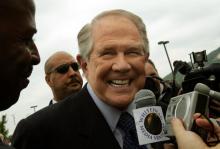
Even a blind squirrel finds a nut once in a while. A million monkeys typing for a million years would eventually produce Shakespeare.
And once in a blue moon, Televangelist and 700 Club head Pat Robertson and I agree on something.
When asked about his position on the decriminalization of marijuana, Robertson said the following:
“I just think it’s shocking how many of these young people wind up in prison and they get turned into hardcore criminals because they had a possession of a very small amount of controlled substance. The whole thing is crazy.”
Umm, can I get an “Amen?”

Strapped for cash and staff, Rick Santorum has enlisted a ragtag but politically potent army to keep his campaign afloat: home-schoolers.
Heading into today's Super Tuesday, Santorum was urging home-schoolers to organize rallies, post favorable features on social media and ring doorbells on his behalf.
"Santorum has been very aggressive in reaching out to the home-schooling community, especially in the last month," said Rebecca Keliher, the CEO and publisher of Home Educating Family Publishing.
Drawing on his experience as a home-schooling father of seven, the former Pennsylvania senator has also sought to rally enthusiasm by pledging to continue that course in the White House.
"It's a great sacrifice that my wife, Karen, and I have made to try to give what we think is the best possible opportunity for our children to be successful," Santorum said during a March 1 campaign stop in Georgia. "Not just economically, but in a whole lot of other areas that we think are important — virtue and character and spirituality."

HIGHLAND PARK, N.J. — Saul Timisela was ordered to report to U.S. Immigration and Customs Enforcement in Newark early on the morning of March 1 to be deported.
Instead, the Indonesian Christian took sanctuary at the Reformed Church of Highland Park, where the Rev. Seth Kaper-Dale is trying to save a group of Indonesian refugees who fled their country to escape religious persecution more than a decade ago.
Timisela may have felt safe given ICE's historical reticence to raid churches where illegal immigrants are being harbored. But at the same time, he was sorry to say goodbye to his wife of 10 years — another Indonesian Christian who's also in hiding because she has overstayed her visa and does not have an open case with the immigration agency.
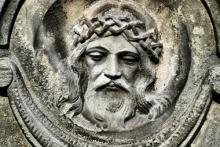
There was a movement back in the 1960s that many of us only have read about, while others vividly remember. Philosophers and theologians explored what was labeled the “Death of God” movement. Interest in the subject has re-emerged particularly as of late because William Hamilton, one of the more prominent voices in the Death of God movement, diedlast week at age 87.
The movement inspired TIME Magazine’s now-famous cover (seen here) in 1966, raising the question in the public forum: Is God Dead? The cover has since been listed by the Los Angeles Times as one of the “Ten Covers that Shook the World.”
Hamilton’s faith was shaken during his teenage years when three of his friends were making a homemade pipe bomb. The project went wrong and detonated, killing two of the three boys.
The two killed were Christians. The lone survivor, an atheist.
Hamilton’s crisis of faith centered around a theological concept known as theodicy, which explores the question: why do bad things happen to good people? More specifically, why does misfortune seem to befall the faithful, while those lacking faith enjoy what seems to be a providential hall pass?

A headline from Reuters stopped me in my tracks earlier this week.
It read, ‘"Pray for us" say Syria rebels as army closes in’." I was struck by how moving I found this statement, this plea.
I do my best to remember places of conflict and strife in my prayers, but very rarely have I been petitioned to pray from a conflict situation by those in the middle of the conflict. It may be a strange reaction on my part to conflate a headline from a news report to be a direct request for my prayers, but that is how I responded when I read it.
“Pray for me” is not an abstract or passive statement. When we are asked to pray for someone, or a group of people, we are charged to bring their need or suffering to God.